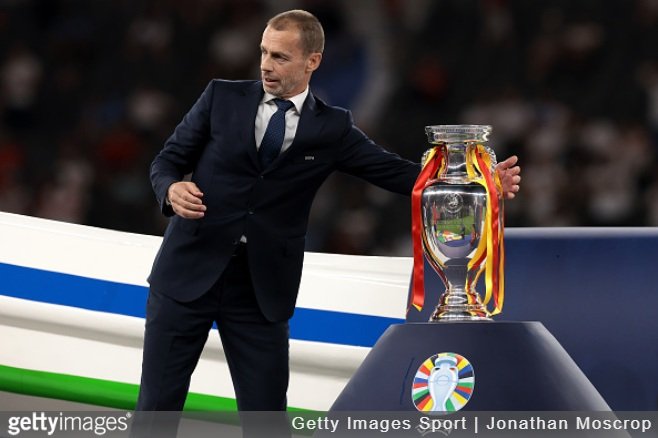UEFA is reportedly preparing to overhaul its entire international qualification system amid growing concerns that fans and broadcasters are losing interest in the current format. Following declining television viewership and reduced enthusiasm for traditional qualifying campaigns, European football is now seeking radical alternatives to reinvigorate its path to the World Cup and European Championship.
A special working group within UEFA’s National Teams Committee has been established to consider potential reforms, with two ideas at the forefront of this: greater use of the Nations League as a qualification mechanism and the introduction of a “Swiss Model” similar to that being rolled out in UEFA’s revamped club competitions.
According to timesUEFA’s chief executives from all 55 European federations were briefed on the potential reforms at a recent meeting in Malaga. Discussions reportedly focused on the balance between competitiveness, financial fairness and audience appeal, three areas where the current system is starting to fall short.
“Broadcast revenue and fan engagement for international qualifiers are down, but are up for the Nations League,” a UEFA official explained. “It’s been considered before, but it’s very difficult to find the right formula, one that gives opportunities to smaller teams while keeping the risks for the big powers.”
The context for this review is clear. Under existing models, top nations often face long qualifying campaigns filled with predictable, one-sided matches. For example, the recent World Cup qualifying group, which saw England play home and away matches against Serbia, Albania, Latvia and Andorra, was a match that was straightforward on paper but generated limited excitement and modest viewership. For broadcasters and sponsors, the lack of high-stakes drama until the end makes it difficult to sell these qualifying rounds.
In contrast, the UEFA Nations League, introduced in 2018, has succeeded in revitalizing the international calendar by creating tiered divisions that add competitive meaning to promotion and relegation. The tournament offered more even contests and the occasional surprise, resulting in higher engagement for television viewers and fans.
Its success is being closely watched, especially as UEFA has already introduced the Nations League as a qualifying route for women’s tournaments, including the Women’s Euros, World Cup and Olympics, from 2023. The new working group will now assess whether a similar model can be extended to the men’s game, effectively turning qualifying into a continuous league-based cycle rather than a series of static groups.
However, using the Nations League as a direct qualifier comes with trade-offs. Smaller countries often rely on hosting glamorous matches against powerhouse nations such as France, Germany and England to reap significant financial benefits. A league-based structure, in which teams primarily play teams of the same rank, risks cutting off these revenue streams and diminishing the romantic appeal of a David vs. Goliath matchup.
To address this, UEFA is also considering a more fundamental structural change, the “Swiss Model.” Borrowed from chess tournaments and adapted for club competition, the system places all 55 European countries into a single ranking pool. Instead of a fixed group, each team will play six or eight games against opponents determined by seeding, ensuring a combination of stronger and weaker matches. Importantly, each matchup will only be played once rather than home and away, which will reduce match congestion.
The results of all these matches are reflected in one comprehensive league table. Eligibility will then be determined by overall ranking. For example, if 16 spots were at stake for the European World Cup, the top 12 teams would automatically qualify and the next eight teams would participate in a play-off for the remaining four spots. This format creates a broader sense of competition and unpredictability, while allowing strong matchups to emerge naturally through seeding.
But enthusiasm for the Swiss model is far from universal. One UEFA official has warned that what works in club football may not translate smoothly to the international stage. “The Swiss format is not a magic formula,” the official said, noting that the national team operates under unique constraints with a small number of matches, limited preparation time and a wide disparity in quality. The system can also complicate logistics for fans and federations, especially when matches span multiple countries.
Still, the desire for reform appears to be genuine. UEFA’s leadership is under pressure to maintain international football’s presence in a crowded sporting world. The expansion of club competitions and the congested domestic calendar have reduced the amount of time and attention fans devote to international qualifiers. If things continue as they are, there is a risk that even the World Cup and the Euros, once pinnacles of national pride, will lose their narrative structure.
In the coming months, UEFA’s working group will publish its findings and recommendations, which are likely to spark a heated debate between federations. Some smaller associations will push to maintain financial safeguards and fair access, while larger countries and broadcasters will insist on formats that guarantee more attractive and commercially viable programming.
UEFA’s objectives are clear, whether through the Nations League, a Swiss-style structure or a hybrid system that combines both. It is about injecting danger, drama and audience attraction into the international stage. The challenge will be to do so without alienating the small nations that form the basis of European football’s identity.
For now, one thing is certain: the days of predictable, low-stakes groups qualifying may be numbered. Instead, UEFA envisions a future where every match counts and the road to the World Cup and the Euros once again captures the imagination of fans across the continent.


